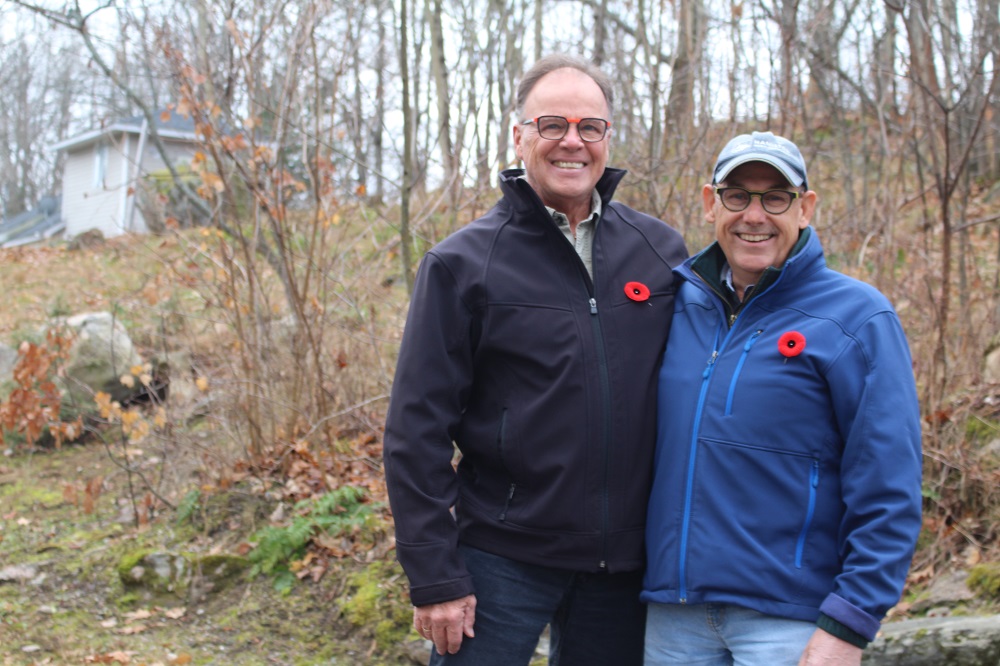Haliburton’s Greg Freeman and Jeff Papiez are comfortably ensconced in Port Charlotte, FL after making the drive south this week, including crossing the Canada-U.S. border when it reopened Nov. 8.
“Beautiful drive. Lovely weather and not too much traffic,” Freeman said via e-mail.
They were concerned about crossing wait times because of the hype about the border reopening so got up early Monday morning to get there as soon as possible.
Freeman said, “We looked at the app Border Wait Times at 4 a.m. and the wait times were very short … 15 minutes or less. The live webcams at the crossings had very little activity so we felt pretty confident that we would not have much of a wait.
They arrived at the Peace Bridge at 5:45 a.m. to find a back-up to the highest point of the bridge and it looked like there were not very many kiosks open. There were many trucks moving right along in their lanes and the cars were jockeying for position to try and find the fastest line. “We all know what that is like – reminiscent of standing in line at the bank. The other line is always faster.”
Checking the app once again, it said the wait time was 35 minutes, but it took them an hour from when they arrived at the bridge to clearing customs.
“In all fairness, it was not bad and many were expecting it to have taken much longer,” Freeman said.
They had four friends cross before 8 a.m. and none of them waited more than 20 minutes; two at the Rainbow Bridge and two at the Peace Bridge. Judging from the Border Wait Times app, they said the busiest time was between midnight and 2:30 a.m.
The two had originally planned to fly and have their car transported but changed their minds when they learned the land borders were reopening.
“Some of our friends chose to do the same thing and many other Snowbirds, once they heard they were able to drive south, solidified their plans and firmed up dates about driving to their winter home.”
Although Freeman and Papiez went to Florida during the height of COVID last winter, many others did not.
Mary and John Anderson stayed on Little Redstone Lake last winter but are preparing to return to Florida at the end of the month. They enjoy being able to stay more active in the warmer climate.
“This year will be different for us as we will be very cautious, keeping COVID prevention in mind at all times,” they said. “We do not plan to participate in any indoor activities or those where many people are together in close quarters.”
In terms of preparations for travel, they generally take three days for travel with two nights in a hotel on the road.
“That will require extra care and caution as well this year as we will not be eating in restaurants but rather we will take a lot of our food with us and maybe order-in for other meals. We are both eligible for the third COVID booster shot, but the six-month waiting period is not up until mid- December and we will be in Florida by that time and as a homeowner, we will be able to arrange for it when we get there.”
Ilsemarie Tarte and her husband, Rainer Hentschel, remained in Haliburton last winter as well.
They have rented a home in St. Petersburg, FL for January to March 2022.
Tarte said they are looking forward to their three-month stint south and feeling better about the pandemic outlook.
“Naturally, we are looking forward to being able to spend more time outdoors in warm weather. Also, as we are going to a place we have been a number of times in previous years, we’ll enjoy reconnecting with friends there.
“Now that we are fully vaccinated, we feel safer and will be driving down. We are lucky to have good insurance from our previous employer and are covered (including COVID) for 90-95 days respectively, so no concerns there.”
The Canadian Snowbird Association said on its website Nov. 5 that U.S. Customs and Border Protection is requiring proof of COVID-19 vaccination and a verbal reason for travel. Fully vaccinated land travellers don’t need a negative COVID-19 test result.
Travellers entering the U.S. by air are still required to present a negative COVID-19 test. They must also provide proof of vaccination and contact information.
“As travel begins to resume, travel volumes and wait times are expected to increase,” the association said. “Travellers should plan for longer than normal wait times and long lines at U.S. land border crossings when planning their trip.”
After arriving in the U.S., the Centre for Disease Control is recommending travellers get tested three to five days after travel.
As for coming home in the spring, the association said travellers are required to provide a negative test taken within 72 hours of their departure flight or arrival at the border if they are entering Canada at a land crossing.
See travel.gc.ca/travel-covid for more information.





